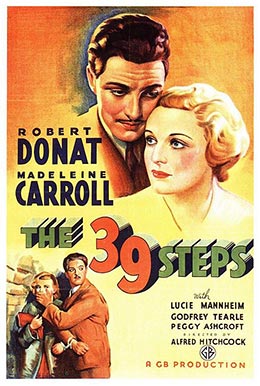
LH probably saw this one upon its release, at the age of about eight. He was immediately impressed –
‘…its tongue-in-cheek adventures, laced with humour and chilling suspense, warmed us up on a December night when the Hippodrome’s heating system broke down.’
A further viewing some years later also remained a fond memory:
‘…when in 1943 I became secretary of the school film society it was among the first bookings I confirmed. I remember now that splendid winter afternoon in the oak-panelled library, when the heavy curtains were drawn at 4.15 and a sprinkling of masters as well as fifty boys chuckled appreciatively through its twists and turns.’

Halliwell |
| The 39 Steps |
Robert Donat stars as Richard Hannay, wrongly accused of murder and on the run from both spies and police – and handcuffed to Madeleine Carroll. With hindsight The Thirty-Nine Steps can be seen as the film which really launched the career of Alfred Hitchcock:
‘[it] is the electrically vivid first flowering of a brilliant young British film-maker who hopes we will enjoy his bag of tricks and not reproach him for the backcloths and non sequiturs’
Halliwell was very sure about what happens to most directors after they achieve success:
‘The films which draw critical attention to the work of young directors usually have one thing in common: their low budgets ensure that they concentrate on essentials and waste no time… Once a film-maker has hit it big, one must regretfully cease to expect from him the peculiar qualities which first took him to the top.’
That might seem harsh with The Lady Vanishes, Rebecca and Foreign Correspondent still to come in this ‘history’, but LH continues:
‘…although almost all the later films have marvellous moments they lack the casual excitement, the sly jokes and the breakneck pace of his British entertainments.’
This one, though, was a winner all the way – even in the eighties:
‘…so many years later, after so many close or distant copies (including Hitch’s own), it is still among the most entertaining ways one can find of spending eighty minutes in a cinema.’